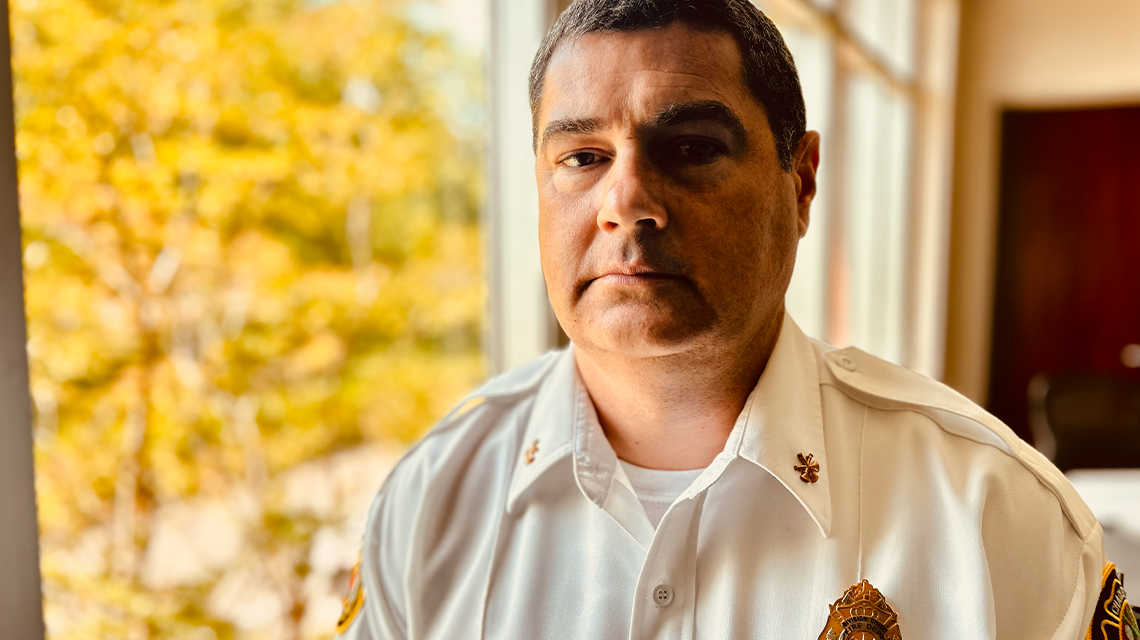Charlotte Fire Leads with Compassion in Commitment to Mental Wellness
Published on May 06, 2025

Captain Andre Fuller, Division Chief Jason Perdue, and Behavioral Health Specialist Nicole Burg are helping lead Charlotte Fire’s commitment to mental wellness—ensuring firefighters have the support they need long after the call ends.
By Kevin Campbell, Charlotte Fire
In the fire service, courage is expected. Grit is essential. And composure in the face of crisis is just part of the job. But inside every firehouse, behind every call for help, firefighters carry silent burdens — grief, trauma, and the emotional cost of saving others.
For Charlotte Fire, Mental Health Awareness Month is a time to not only acknowledge those burdens, but to reinforce the department’s commitment to supporting its members beyond the fireground — from mental wellness education to peer-led outreach and clinical care.
“We see the worst moments in people’s lives. And sometimes, we see them over and over,” said Division Chief Jason Perdue, who oversees Charlotte Fire’s behavioral health initiatives. “That adds up. And if our people don’t have the tools or support to process what they’re carrying, it can lead to devastating outcomes.”

Division Chief Jason Perdue oversees Charlotte Fire’s mental wellness programming and believes the department’s biggest strength is its willingness to talk about tough topics.
The statistics are sobering: 30% of firefighters suffer from anxiety or depression. More than a third meet the criteria for PTSD. And 77% will require behavioral health support at some point during their career. Perhaps most alarming — firefighters are more likely to die by suicide than in the line of duty .
“This work matters because our people matter,” Perdue said. “If we can help even one firefighter find support before they hit a breaking point, it’s worth every bit of effort.”
Perdue likens the accumulation of trauma to filling a coffee cup.
“Every tough call, every personal stressor, it adds a little more to the cup,” he said. “If we don’t have ways to pour some of that out — through talking, therapy, coping skills — eventually, it overflows. That’s when you see burnout, breakdowns, or worse.”
To help firefighters manage the weight of the job, Charlotte Fire has implemented a multi-tiered wellness approach. At the heart of it is the Peer Support Team — a growing group of trained firefighters ready to listen and connect colleagues to further help when needed.
Captain Andre Fuller is one of them.
“We’ve always been the ones who run in, who fix things,” Fuller said. “But nobody teaches you how to fix yourself. And that’s what we’re changing.”
Charlotte Fire Captain Andre Fuller is part of the department’s Peer Support Team, where he uses his own experiences to help fellow firefighters open up about their mental health.

Fuller, a strong presence at the firehouse, said being open about his own struggles has helped break down barriers with fellow firefighters.
“If someone sees me — a guy who’s always been seen as tough — say, ‘Hey, I needed help,’ it gives them permission to do the same,” he said.
Peer supporters like Fuller are trained to identify warning signs, initiate conversations, and build trust.
“If a firefighter who’s usually cracking jokes suddenly goes quiet, withdraws from the crew — that’s a sign,” Fuller said. “And it doesn’t have to be a confrontation. Sometimes all it takes is, ‘Hey, you good?’ That small check-in can be the start of a life-saving conversation.”
That personal connection, Fuller said, is critical.
“We do everything else together — train as a team, eat as a team, respond to emergencies as a team. So why wouldn’t we talk through hard things as a team too?”
Supporting that peer effort is Nicole Burg, Charlotte Fire’s first Behavioral Health Specialist and a licensed clinician. Burg collaborates closely with the peer team, stepping in when issues go beyond a peer’s scope.

Behavioral Health Specialist Nicole Burg and therapy dog Asher are key figures in Charlotte Fire’s mental health support network—breaking down barriers and building trust across the department.
“Peers are the boots on the ground,” Burg said. “But when something surfaces that needs clinical care, that’s where I come in. And we work together to get that firefighter what they need.”
Burg’s impact has also been amplified by an unlikely partner: Asher, her K9 therapy dog.
“When I show up at a station, people might not be ready to talk to me,” she said. “But everyone wants to see Asher. He breaks the ice. He helps people let their guard down.”
Asher, part of Charlotte Fire’s K9 Support Program, has quickly become a familiar face at firehouses. Whether sitting in on peer debriefings or just visiting with crews, the therapy dog is often the first step toward healing.
“We’ve seen firefighters go from completely withdrawn to smiling, laughing, engaging — just because Asher walked in the room,” Burg said. “And that moment of connection can open the door to a real conversation.”

Asher, one of Charlotte Fire’s therapy dogs, does more than brighten a room—he helps firefighters open up, decompress, and begin the path toward healing.
Beyond peer support and therapy, the department is expanding access to training programs like “Struggle Well,” which teaches firefighters how to transform adversity into growth. The Crisis Intervention Training (CIT) course also helps members recognize behavioral health challenges in themselves and others.
“These are more than check-the-box classes,” said Perdue. “They teach real, applicable skills. How to deal with trauma, how to help your crew, how to help yourself.”
Technology is also playing a role. Charlotte Fire recently launched the Lighthouse App, a health and wellness platform that provides confidential access to resources, including counseling, treatment centers, peer contacts, and training materials.

Every shift brings the unknown. Behind the gear, Charlotte Firefighters carry the weight of what they’ve seen—and what they may face next.
“It’s a powerful tool, especially for our company officers who may be the first to notice when someone is struggling,” Perdue said. “They can pull up the app and connect that person with help immediately.”
For Burg, the challenges firefighters face are as complex as they are chronic.
“Unlike military combat, which has a defined beginning and end, firefighters face trauma over and over,” she said. “You might run into a burning building today, and have to do it again tomorrow. That cumulative stress is different, and harder to treat.”
Family life is another factor.
“Shift work, missed holidays, the danger of the job — it puts a strain on relationships,” Burg added. “And often, firefighters worry more about how their families are coping than themselves.”

Fighting fire is only part of the job. It’s the smoke, the chaos, and the constant exposure to trauma that linger long after the flames are out.
Then there’s the cultural barrier.
“In the fire service, emotions have historically been seen as weakness,” Burg said. “So they push it down. They stay quiet. And sometimes, that silence does more damage than the trauma itself.”
Changing that mindset takes time, Fuller said — but it’s happening.
“More and more, we’re hearing guys say, ‘I talked to someone,’ or ‘I went to counseling,’” he said. “That used to be rare. Now it’s becoming normal.”
Throughout May, Charlotte Fire is sharing weekly mental health content with its members. Topics include how to spot signs of distress, healthy coping strategies, and how to support a colleague in need. The department also plans to release a recap video to reinforce its ongoing commitment to wellness.
The message is constant: No one has to face this alone.
“If you're struggling, talk to someone,” Burg said. “It doesn’t have to be me — it can be your crew, your captain, anyone. Just don’t keep it inside. That silence can hurt more than anything else.”

They respond to destruction, loss, and the aftermath of emergencies most will never see. It’s these daily realities that make mental wellness support essential in the fire service.
That goal is shared by leadership at the highest level of the department.
"We are committed to supporting the whole firefighter—from their first day on the job to long after they leave the firehouse," said Charlotte Fire Chief Reginald Johnson. "Mental wellness is a priority, and we will continue building a culture where asking for help is seen as strength, not weakness."
Fuller echoed that sentiment with a quiet conviction shaped by years on the job.
“You’ve got to understand — we’re human. Yeah, we wear the uniform, but we feel it all,” he said. “I don’t want anyone waiting until it’s too late to ask for help. If something’s weighing on you, say something. You’re not alone. Not here. Not ever.”
Charlotte Fire is known for saving lives. Now, it’s working just as hard to save the lives of its own.
If you or someone you know is experiencing a mental health crisis, dial 988 to reach the Suicide and Crisis Lifeline. Help is available 24/7.